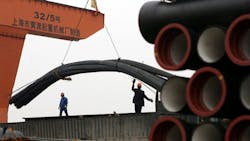AISI's Gibson: China 'Has to Get Out of the Steel Business'
While applauding efforts by the Obama Administration to turn up the heat on China, American Iron and Steel Institute President and CEO Thomas Gibson said the United States and other nations continue to experience severe economic impacts from the oversupply of steel produced largely by Chinese state-sponsored companies. He said policymakers must address the “root cause” of the problem.
“We believe that the Chinese government has to get out of the steel business,” said Gibson, and let its steel industry operate according to market principles. Gibson spoke July 13 on a conference call with the press.
In 2015, China’s production of crude steel fell 2.3% from the previous year, the World Steel Association reported, but its share of the world’s production grew slightly to 49.5%. Gibson said China’s oversupply of steel reached 112 million tons in 2015 and added that some reports estimated excess production would increase this year. That oversupply has wreaked havoc on U.S. steel companies, where production fell 10.5% last year and approximately 10% of the workforce has been laid off.
“Steel industry employment has declined by nearly 14,000 jobs since January 2015, forcing some steel plants to close temporarily,” said Gibson. “This is due in large part to the huge surge in imports, which is the result of foreign government interventionist policies that have fueled global overcapacity in steel.”
Gibson added that China was responsible for more than half the global oversupply of steel. He noted that nine of the 10 largest steel producers in China are state-owned. While these firms may be selling steel at a loss, China is directing state-owned banks to “continually refinance the debt” and also sweep the debts off the books.
In an effort to address declining domestic demand, China announced that it would reduce steel production as much as 150 million tons over the next five years. However, Gibson said China had made similar commitments in the past and “each time capacity has actually increased in China.”
AISI will continue to urge the Obama Administration to treat China as a non-market economy for anti-dumping purposes. Gibson noted that the administration has pursued the steel dumping issue at a variety of domestic and international meetings in recent months, including the North American Steel Trade Committee and those of the Organization for Economic Co-operation and Development (OECD), G7 and G20.
Gibson will testify July 14 before the Senate Banking Committee on the steel crisis.
Other advanced nations have joined the U.S. in seeking to reduce Chinese steel exports. In Beijing on July 13, European Commission President Jean-Claude Juncker announced that the EU and China had created a working group to discuss the steel crisis, the Guardian reported.
Juncker tied the issue of recognition of China by the EU as a market economy to progress on the steel dispute, saying there was a “clear link between the steel overcapacity of China and the market economy status for China.” China would gain increased export opportunities if it achieves market economy status (MES).
European steelmakers on July 12 again warned EU leaders not to rush into granting MES to China.
“The EU must maintain effective trade defense instruments in order not to put at risk millions of jobs as well as tens of billions of euros in annual investment. They must stand their ground and not submit to pressure from the Chinese government to adopt this damaging and unnecessary MES policy, particularly as China is not meeting its own obligations,” said Axel Eggert, director of the European Steel Association.
About the Author
Steve Minter
Steve Minter, Executive Editor
Focus: Leadership, Global Economy, Energy
Call: 216-931-9281
Follow on Twitter: @SgMinterIW
An award-winning editor, Executive Editor Steve Minter covers leadership, global economic and trade issues and energy, tackling subject matter ranging from CEO profiles and leadership theories to economic trends and energy policy. As well, he supervises content development for editorial products including the magazine, IndustryWeek.com, research and information products, and conferences.
Before joining the IW staff, Steve was publisher and editorial director of Penton Media’s EHS Today, where he was instrumental in the development of the Champions of Safety and America’s Safest Companies recognition programs.
Steve received his B.A. in English from Oberlin College. He is married and has two adult children.
